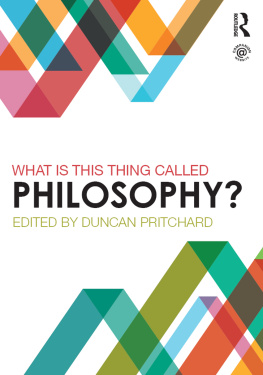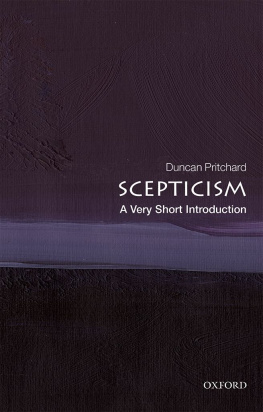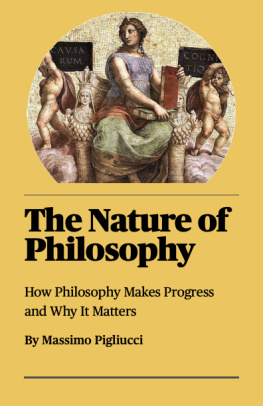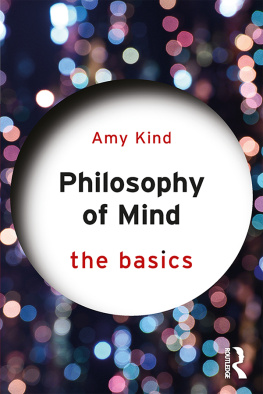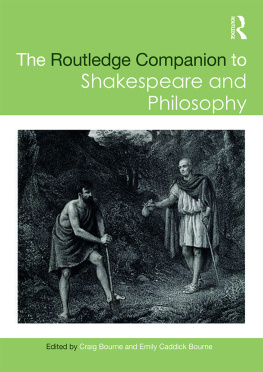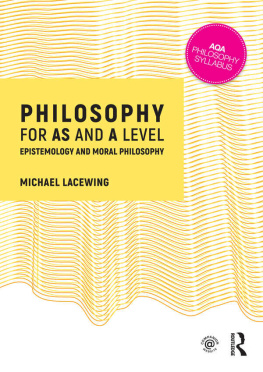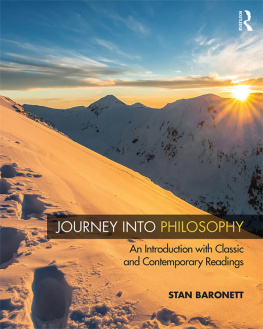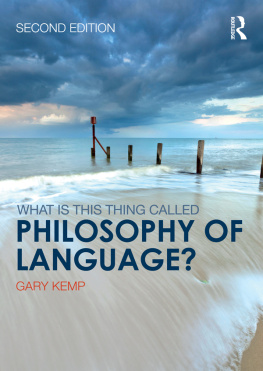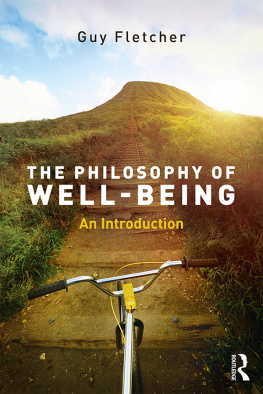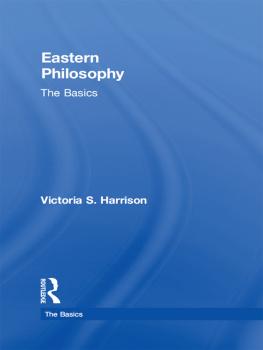
what is this thing called philosophy?
What Is This Thing Called Philosophy? is an impressive book. The range of topics is excellent and covers much that is both humanly engaging and philosophically important. There is great clarity and intellectual commitment in the writing a fine resource for anyone new to philosophy.
Stephen Hetherington, UNSW, Australia
What Is This Thing Called Philosophy? is an excellent, wide ranging and stimulating textbook, written by first rate academics. Both deep and lively, it introduces the main contemporary issues in the major areas of philosophy and will no doubt be of great service to anyone approaching the field for the first time.
Claudine Tiercelin, Collge de France and Institut Jean Nicod, France
What Is This Thing Called Philosophy? is the definitive textbook for all who want a thorough introduction to the field. It introduces philosophy using a question-led approach that reflects the discursive nature of the discipline. Edited by Duncan Pritchard, each part is written by a high-profile contributor focusing on a key area of philosophy, and contains three or four question-based chapters offering an accessible point of engagement.
The core areas of philosophy covered are:
Ethics
Political Philosophy
Aesthetics
Epistemology
Philosophy of Mind
Metaphysics
Philosophy of Science
Philosophy of Religion
The Meaning of Life.
The accompanying Routledge companion website features valuable online resources for both instructors and students including links to audio and video material, multiple-choice questions, interactive flashcards, essay questions and annotated further reading. This is the essential textbook for students approaching the study of philosophy for the first time.
Contributors: Michael Brady, Berit Brogaard, Thom Brooks, Axel Gelfert, Tim Mawson, Thaddeus Metz, Kristie Miller, Duncan Pritchard, Kathleen Stock.
Duncan Pritchard is Professor of Philosophy at the University of Edinburgh, UK.
What is this thing called?
The Routledge What is this thing called? series of concise textbooks has been designed for use by students coming to a core and important area of philosophy for the first time. Each volume explores the relevant central questions with clear explanation of complex ideas and engaging contemporary examples. Features to aid study include text boxes, chapter summaries, study questions, further reading and glossaries.
What Is This Thing Called Knowledge? third edition
Duncan Pritchard
What Is This Thing Called Philosophy of Language?
Gary Kemp
What Is This Thing Called Metaphysics? second edition
Brian Garrett
What Is This Thing Called Ethics?
Christopher Bennett
EDITED BY DUNCAN PRITCHARD
what is this thing called philosophy?

First published 2016
by Routledge
2 Park Square, Milton Park, Abingdon, Oxon OX14 4RN
and by Routledge
711 Third Avenue, New York, NY 10017
Routledge is an imprint of the Taylor & Francis Group, an informa business
2016 Duncan Pritchard, editorial and selection matter, individual parts and chapters, the contributors
The right of the author to be identified as the author of the editorial material, and of the contributors for their individual chapters, has been asserted in accordance with sections 77 and 78 of the Copyright, Designs and Patents Act 1988.
All rights reserved. No part of this book may be reprinted or reproduced or utilised in any form or by any electronic, mechanical, or other means, now known or hereafter invented, including photocopying and recording, or in any information storage or retrieval system, without permission in writing from the publishers.
British Library Cataloguing in Publication Data
A catalogue record for this book is available from the British Library
Library of Congress Cataloging in Publication Data
Pritchard, Duncan.
What is this thing called philosophy? / Duncan Pritchard. -- 1 [edition].
pages cm. -- (What is this thing called?)
Includes bibliographical references and index.
1. Philosophy--Introductions. I. Title.
BD21.P75 2015
100--dc23
2015021942
ISBN: 978-0-415-83976-1 (hbk)
ISBN: 978-0-415-83977-8 (pbk)
ISBN: 978-0-203-77100-6 (ebk)
Typeset in Berling LT Std
by Saxon Graphics Ltd, Derby
Additional materials are available on the companion website at www.routledge.com/cw/pritchard
CONTENTS
Duncan Pritchard
Michael Brady
Thom Brooks
Kathleen Stock
Duncan Pritchard
Berit Brogaard
Kristie Miller
Axel Gelfert
Tim Mawson
Thaddeus Metz
Duncan Pritchard
Michael Brady, University of Glasgow, UK
Berit Brogaard, University of Miami, USA
Thom Brooks, Durham University, UK
Axel Gelfert, National University of Singapore, Singapore
Tim Mawson, Oxford University, UK
Thaddeus Metz, University of Johannesburg, South Africa
Kristie Miller, University of Sydney, Australia
Duncan Pritchard, University of Edinburgh, UK
Kathleen Stock, University of Sussex, UK
HOW TO USE THIS TEXTBOOK
The goal of this textbook is to provide an overview of all the main areas of philosophy: ethics, political philosophy, aesthetics, epistemology, philosophy of mind, metaphysics, philosophy of science, and philosophy of religion. There is also a concluding part on the meaning of life, a philosophical topic that cuts across several core areas of philosophy. Each part has been written by an expert in the field, and breaks the topic down into three questions that define that field, with a chapter devoted to exploring each question. Like all the other textbooks in Routledges What is this thing called X? series, this book has been designed to be as user-friendly as possible, and does not presuppose any prior background knowledge.
Each chapter closes with a summary of the main points made in that chapter and offers some questions for discussion. For those who wish to explore the topic discussed in that chapter in more detail, there is also a section recommending additional introductory and advanced readings. A further section identifies free internet resources that are relevant to that chapter. Within each chapter youll find text boxes which give supplementary information relevant to what is being discussed in the main text, such as more information about an historical figure who has been mentioned.
Although terminology is avoided where possible, you dont need to worry if you come across a technical word that you dont understand, since all terminology is explained at the back of the book in a glossary. (Technical words that have corresponding entries in the glossary are identified in the text by being in bold at first mention.) There is also an introductory section on the nature of philosophy and at the back of the book you will find some practical advice about writing good philosophy essays. Finally, at the very end of the book, there is an index.
Duncan Pritchard
DUNCAN PRITCHARD
WHAT IS PHILOSOPHY?
Answering the question, What is philosophy?, is by no means straightforward. Indeed, it is arguably a philosophical task in itself. Part of the difficulty relates to the fact that philosophy has changed its meaning over the years. The first philosophers were the ancient Greeks, around the sixth century BCE. Indeed, the term philosophy comes from the Greek it means love of wisdom. So construed, the philosopher in the ancient world was someone who was concerned with a range of questions, not all of them of a kind that we would these days think of as philosophical.
Next page
